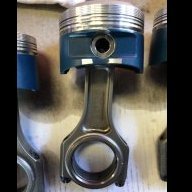Forged Rb25 /w Low Comp
Announcements
-
Similar Content
-
Latest Posts
-
Well, hydraulic lifters will get noisy if they are dirty/fouled in some way, and exactly how that manifests will depend on exactly what schmutz is where. There is a procedure on here somewhere for dismantling and soaking/cleaning them. Replacing them with new is about 50% of the work and about 5% of the money!
-
By myrbgivesmeheadaches · Posted
Thanks for the reply @GTSBoy this is is a hydraulic lifter engine. Yea right i did not realise the lifters were supposed to be compressible while installed. I could push them down but i had to lean almost my while body weight on them. I have never heard of a lifter/ lifters ticking only at hot idle and getting worse the hotter it gets. I have owned a few jdm cars with noisy lifters. This noise is slightly more subtle, it is more of a sharp gentle metalic tic than the solid and more loud tapping I've heard on lifters. I have used a metal rod, alloy tube, hose and stethoscope and could not find the source of the tick. But it appears to be loudest on the actual engine block behind the exhaust cam gear and next to the oil filter. I had mate (40 year old mechanic) go over it with me and he couldn't find it either.. Could it be a cam seal issue of some sort? Cheers -
This seems problematic and unlikely at the same time. Vanilla RB2Xs have hydraulic lifters. They do have "zero" clearance, but only when running with oil pressure inside them. When not running, you should be able to compress them and obtain heaps of clearance. RB26s and Neos have solid lifters. They should have ~0.3mm and ~0.5mm on the inlet and exhaust respectively. If they have zero clearance then bad things are happening. With nothing else being wrong, it would mean that the valves would be held slightly (ever so slightly) open when they are supposed to be closed and it should have all sorts of problems when running, caused by leakage in/out through the valves. Or, zero clearance can indicate severe valve seat recession. None of it is good. Have you used a piece of hose as a stethoscope to try to localise the noise?
-
By myrbgivesmeheadaches · Posted
Sorry for reviving an old post, but I'm having the same hot idle tick issue. Did anyone ever find out what it was? I have checked/ replaced Injectors Coils checked Lifter clerance (is at zero) Checked Cam lobes Replaced exhaust gasket and studs Would appreciate any advice this is driving me nuts
-








Recommended Posts
Create an account or sign in to comment
You need to be a member in order to leave a comment
Create an account
Sign up for a new account in our community. It's easy!
Register a new accountSign in
Already have an account? Sign in here.
Sign In Now